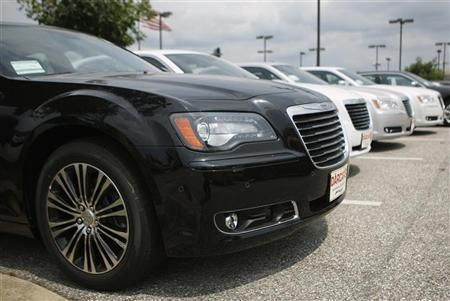
U.S. auto sales are expected to increase by as much as 20 percent in August as better financing deals and an improving housing market encouraged consumers to replace aging cars and trucks.
Economists polled by Thomson Reuters expect an annual selling rate for new cars and trucks in August of 14.2 million vehicles, which would mark the third straight month above 14 million. Analysts expect sales to rise in the range of 16 to 20 percent from a year ago.
However, U.S. sales in July came in weaker than expected, so analysts will be watching when automakers report results on Tuesday to see whether high unemployment and weak consumer confidence will dent demand.
"The strength in August light-vehicle sales takes some of the pressure off expectations for the balance of the year, but a high level of risk lingers," said Jeff Schuster, senior vice president at LMC Automotive. "We expect the current seesawing in auto sales to continue for the foreseeable future, but the overall picture in 2012 remains positive."
Auto sales, which offer an early snapshot of consumer demand, have been one of the bright spots in the U.S. economy, and car companies expect a second-half sales increase spurred partly by the introduction of a slate of new models.
Industry officials also say that the average age of cars on U.S. roads - 11 years, an all-time high - continues to drive demand.
"While unemployment and consumer sentiment data haven't supported U.S. sales, we believe that these factors are being more than offset by the solid financing environment, improved housing data, and high pent-up trade-in demand from former new car buyers of 2004-08 who still own their vehicles," Barclays analyst Brian Johnson said in a research note.
Johnson reiterated he expects sales for the full year to finish around 14.4 million vehicles as demand picks up toward the end of the year.
U.S. auto sales fell to 10.4 million vehicles in 2009 before rising to 11.6 million and 12.8 million the following two years, respectively. In the 10-year period ended in 2007, U.S. auto sales averaged nearly 17 million annually.
MIXED SIGNALS
Executives at General Motors (GM.N) and Ford Motor Co (F.N) have also said the improving housing sector could spur pickup truck sales.
But signs of a continued economic recovery have been mixed.
Consumer spending in July posted the biggest increase in five months and home prices in June rose for the fifth straight month. However, consumer confidence this month slid to the lowest level in nine months as Americans were more pessimistic about business and job market prospects.
And the deterioration of the European auto market has raised fears of a contagion in the U.S. market.
Automakers also have gotten creative in propping up sales without resorting to broad-based consumer incentives, which have declined, said Edmunds.com Vice Chairman Jeremy Anwyl.
"In June, GM was helped by sales to fleet buyers that were 35 percent of their total," he said. "Last month, we heard about BMW's (BMWG.DE) one-day demo sale to dealers. There has been a flurry of stair-step incentive programs in the market, and I suspect that some manufacturers have been working deals with subprime lenders to help expand the market as well."
Anwyl said that those types of deals were not always reflected in the monthly incentive numbers tracked by research firms, but that they were nonetheless real costs to the automakers.
Another factor supporting new-car demand is the high price of used cars, said Kelley Blue Book senior analyst Alec Gutierrez. "Savvy consumers are likely opting to pay an extra $20 or $30 per month to buy or lease a new car than settle for a used vehicle with 20,000 miles or more," he said.
Japanese automakers Toyota Motor Corp (7203.T) and Honda Motor Co (7267.T) are expected to show the strongest gains among the major automakers as their inventory levels rebound from last year's shortages caused by the Japanese earthquake. Analysts expect sales gains of 37 to 42 percent for Toyota, and 56 percent to 62 percent for Honda.
Gains by the U.S. automakers will be more muted, with GM expected up 2 to 6 percent. Ford sales are expected to increase 7 to 10 percent, while Chrysler's (FIA.MI) are forecast to rise 8 to 12 percent. The market share of all three U.S. automakers is expected to fall from August 2011, but increase from July, according to TrueCar.com.
© Thomson Reuters.




